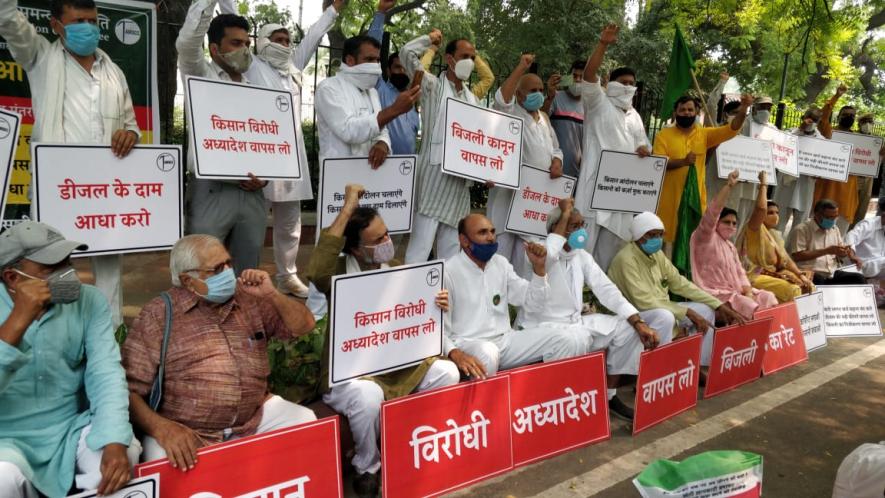Farm Bills: Marginal Farmers will be Further Alienated, Says Yogendra Yadav

A protest meeting was called at Jantar Mantar at noon by protesters, including office bearers of AIKSCC.
The All India Kisan Sangharsh Coordination Committee (AIKSCC) held a countrywide protest on Monday to press the Centre to scrap three bills pertaining to contract farming, marketing and the stocking of agriculture produce. The demonstrations coincided with the first day of the monsoon session of Parliament, where the bills were introduced by the government.
The three bills – The Farmers (Empowerment and Protection) Agreement of Price Assurance and Farm Services Bill, 2020, The Farmers’ Produce Trade and Commerce (Promotion and Facilitation) Bill, 2020 and The Essential Commodities (Amendment) Bill, 2020 – will replace ordinances which came into force after having been cleared by the cabinet and receiving Presidential assent on June 5.
Since then, the ordinances had sparked a spate of protests across the country by farmers’ bodies, who accuse the Bharatiya Janata Party (BJP) government for bringing in ‘anti-farmer’ changes into the agricultural economy.
On Monday, demonstrations were staged in districts and sub-division head quarters across the country.
In Delhi, a protest meeting was called at Jantar Mantar at noon. Protesters, including office bearers of AIKSCC – an umbrella body of numerous farm organisations – were, however, barred from entering the area by the police, possibly due to the ongoing restrictions on assembly of people in light of COVID-19.
The bills are aimed at achieving the “corporatisation” of Indian agriculture, said Yogendra Yadav, President of Swaraj India, who is also a national executive member of the AIKSCC.
The Essential Commodities (Amendment) Bill, 2020 seeks to amend the 1955 law that had empowered the government to limit stock piling of foodgrains by the traders or companies, and to also cap prices. In the proposed legislation, the Centre has removed the stock and price restrictions, and added that both will now be triggered “only” in extraordinary circumstances like war and famine, among others.
The Farmers’ Produce Trade and Commerce (Promotion and Facilitation) Bill, 2020 allows for the trade of farmers’ produce outside the markets notified under state laws, namely the Agricultural Produce Market Committees (APMCs), colloquially known as anaj mandis.
The Farmers (Empowerement and Protection) Agreement of Price Assurance and Farm Services Bill, 2020 introduces a framework of contract farming in which a farmer can enter into an agreement prior to production.
None of the changes will benefit the farmers’ community, Yadav told NewsClick. “One will benefit the stockers, the other will ensure huge profits for big private traders, while the third is to uphold the interests of the agri-processing companies,” he said.
“With no restrictions on stocks, a big trader will be allowed to play with the market and drive the prices up and down – all to ensure huge profits; the anaj mandis will collapse in the years to come as no tax is proposed when a trader directly approaches a farmer, thereby allowing the government to dismantle the existing system of procurement and remunerative prices. In addition to all this, even though contract farming looks beneficial on the face of it, we need to know that it will be an unequal agreement – with gross disparity of bargaining power between a farmer and an agri company,” Yadav explained.
As a result, Yadav added, the first to be hit by these changes will be the marginal farmers – with holdings below one hectare – who also constitute the majority of nation’s farming population. “They will get further alienated from the agriculture economy,” he said.
Over the past few months, farmers have led protests in various states including Punjab, Madhya Pradesh, Haryana and Karnataka. They are miffed with the Centre for not being consulted before the changes were brought in.
The farm ordinances had also snowballed into a political issue, with opposition parties hitting out at the Narendra Modi government for subjugating farmers.
Get the latest reports & analysis with people's perspective on Protests, movements & deep analytical videos, discussions of the current affairs in your Telegram app. Subscribe to NewsClick's Telegram channel & get Real-Time updates on stories, as they get published on our website.
























